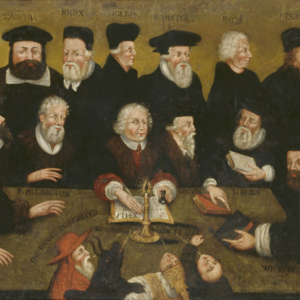
Descrizioni
Do you find yourself grappling with complex theological writings, whether ancient or modern? This lesson is designed to equip you with the essential skills to effectively read, analyze, and understand theological texts, enabling you to grasp their meaning, historical context, and underlying theological arguments. We will approach these texts with a commitment to discerning biblical truth and understanding the rich tapestry of Christian thought.
This isn't just about reading; it's about learning how to read critically, how to ask the right questions, and how to connect the text to broader theological themes and historical developments.
What You'll Learn & Practice:
We'll tailor our sessions to your specific needs and the texts you wish to explore, but common areas of focus include:
-
Foundational Principles of Interpretation (Hermeneutics):
-
Understanding the importance of context (historical, cultural, literary, theological).
-
Identifying the author's purpose and audience.
-
Distinguishing between descriptive and prescriptive passages.
-
-
Textual Analysis Techniques:
-
Close Reading: Breaking down sentences and paragraphs to understand their precise meaning.
-
Identifying Key Terms & Concepts: Pinpointing central theological vocabulary and ideas.
-
Tracing Arguments: Following the logical flow of the author's reasoning.
-
Recognizing Literary Devices: Understanding how metaphors, analogies, and other literary forms contribute to meaning.
-
-
Understanding Theological Contexts:
-
Historical Context: How did the historical circumstances of the author and their era influence the text?
-
Philosophical Context: What philosophical ideas (explicit or implicit) are at play in the text?
-
Denominational/Tradition Context: How does the author's specific theological tradition (e.g., Reformed, Lutheran, Catholic, Orthodox, Pentecostal/Charismatic) shape their arguments?
-
-
Connecting Text to Broader Theology:
-
How does the specific text relate to the overall framework of Christian doctrine?
-
Identifying implicit and explicit theological claims.
-
Understanding the text's contribution to areas like Christology, Soteriology, Ecclesiology, etc.
-
-
Practical Application:
-
Applying interpretive skills to various types of theological texts (e.g., systematic theology, historical theology, biblical commentaries, confessional documents, contemporary theological works).
-
Developing your own critical questions for engaging with new texts.
-
Improving your ability to summarize, critique, and articulate your understanding of complex theological ideas.
-
How the Lesson Works:
Our sessions are highly interactive and practical, focusing on direct engagement with texts:
-
Student-Led Text Selection (Optional): You can bring specific theological texts you are studying or interested in, and we will work through them together.
-
Guided Analysis: We'll read and analyze passages, discussing vocabulary, grammar, logical flow, and theological implications.
-
Discussion & Dialogue: We'll engage in rich conversations about the text's meaning, its historical significance, and its theological contributions.
-
Question & Answer: This is a dedicated space to clarify doubts and explore challenging concepts.
-
Personalized Feedback: You'll receive guidance on your interpretive approach and how to strengthen your analytical skills.
-
Resource Suggestions: I can recommend further reading on hermeneutics, specific theological topics, or additional texts for your study.
Who is this lesson for?
This lesson is ideal for:
-
Students of theology or religious studies (undergraduate or postgraduate) needing help with course readings.
-
Pastors, ministry leaders, or lay learners seeking to deepen their understanding of theological literature.
-
Anyone who wants to move beyond superficial reading to truly grasp the depth and nuance of theological texts.
-
Individuals interested in developing robust critical thinking and interpretive skills for engaging with Christian thought.
Master the art of interpreting theological texts and unlock deeper understanding! Book a free trial lesson to discuss your specific texts and learning objectives.
Cafetalk's cancellation policy - Before request is confirmed (fixed) Cancellation possible at any time without charge. After request is confirmed (fixed) More than 24 hours before lesson start time.→ Cancellation is possible at any time. Less than 24 hours before lesson start time.→ The tutor may take a cancellation fee. No-Show→ The tutor may take a cancellation fee. (Please check with the tutor for details.)
Modalità di cancellazione di Cafetalk
Prima che la richiesta sia confermata (fissata)
- La cancellazione è possibile in qualsiasi momento.
Dopo che la richiesta sia stata confermata (fissata)
- Più di 24 ore prima dell'inizio della lezione.→ La cancellazione è possibile in qualsiasi momento.
- Meno di 24 ore prima dell'inizio della lezione→ Il tutor potrebbe richiedere una penale per la cancellazione.
-
No-Show→ Il tutor potrebbe richiedere una penale per la cancellazione. Si prega di controllare i dettagli del tutor.
(Si prega di controllare i dettagli del tutor.)
Le sue lezioni
-


Academic Writing for Theology/Humanities
Crafting Compelling Arguments60min 4,500PLezioni di prova -


Reformation-Era Church History
Explore Reformation History and Its Key Figures60min 4,500PLezioni di prova -


Medieval Church History
Explore the Interesting History of the Medieval Church60min 4,500PLezioni di prova -


Custom Church History Session
Tailored Lesson on Chosen Area/Topic in Church History60min 4,500PLezioni di prova -


Christian Theology 101
Christian Theology 101: Exploring the Core Beliefs60min 4,500PLezioni di prova -


English Reading and Writing Practice
Focused Help with English Reading and Writing Skills30min 2,000PLezioni di prova -


English In Context - For Travel or Work
Contextual, Everyday, Professional English Session by a British Native Speaker30min 2,000PLezioni di prova -


Conversational English Practice
Engaging Conversation Practice with a Native Speaker20min 1,500PLezioni di prova






